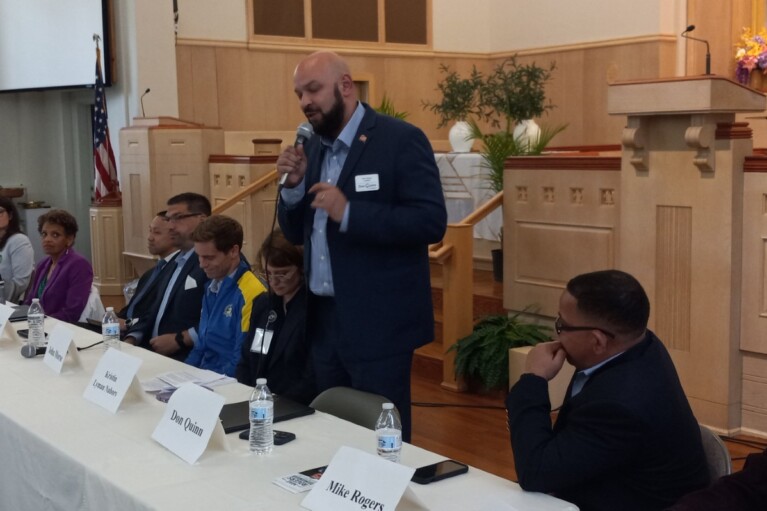Opinion: An Open Letter to Sens. Cardin and Van Hollen on Redistricting Reform

Dear Senators,
Now, the “For the People Act of 2021” is in your hands. The Senate Rules and Administration Committee has set a May 11 markup of this bill to expand voting rights, enhance campaign finance reform, create new ethics rules for federal officeholders, mandate independent redistricting, and more.
But, as you know, Sen. Joe Manchin (D-W.Va.) wrote in a recent Washington Post opinion, “There is no circumstance in which I will vote to eliminate or weaken the filibuster.” And since Senate Majority Leader Chuck Schumer (D-N.Y.) is not likely to attract enough Republicans to achieve a 60-vote end to a filibuster, he has postponed the deadline for voting on the bill to the end of August.
Even Democratic support for the bill has begun to splinter quietly, as President Biden, the Congressional Black Caucus, and some advocacy groups pivot from the entire 886-page bill to several narrower pieces of legislation, for the reasons mentioned above.
This commentary is focused on one provision of this mammoth bill that requires states to establish independent redistricting commissions to carry out congressional redistricting.
As a redistricting buff since 1970, I am arguing that the best alternative to end the 209-year-long partisan gerrymandering could be a narrower bill that would appear to have a better chance of passage — with some moderate Republicans who support the measure.
The best bill would be H.R. 3572, the Redistricting Reform Act of 2019, sponsored by Rep. Zoe Lofgren (D-Calif.). The text of H.R. 3572 is IDENTICAL to what the House voted to pass in March, including any amendments to the redistricting provisions of H.R. 1, the House version of the For the People Act. On the Senate side, Subtitle E – Redistricting Reform of the Senate bill, S.1, the For the People Act of 2021, is also identical to S.2226 – Redistricting Reform Act of 2019.
The Lofgren legislation has been introduced during the last eight sessions of Congress (2005-2020). It has died in committee each time it has been introduced because it has lacked adequate support among leadership to advance. Eight sessions!!!!
Oddly, President Obama had not pushed the Lofgren bill during his first two years (2009-10), when fellow Democrats controlled the House and Senate. At the time, it seemed his Democratic Party would do well enough in the 2010 midterms to dominate redistricting for the decade now coming to an end.
It turned out the opposite way. A Republican wave that year (fueled in part by fundraising for the Republican State Leadership Committee’s Redistricting Majority Project) resulted in all-GOP state governments getting to draw almost half the 435 congressional districts the next year, while all Democratic governments drew about 50. This result is one of Obama’s most embarrassing moments.
In that two-year congressional session, no one in the Maryland delegation co-sponsored the Lofgren legislation. Suddenly, after President Donald John Trump’s victory in 2016, the 2017 Lofgren legislation’s number of co-sponsors grew to 79, including five from Maryland: John P. Sarbanes (D), Anthony G. Brown (D), Steny H. Hoyer (D), Jamie B. Raskin (D) and then-Rep. John K. Delaney (D).
Only four of 83 co-sponsors of the 2019 Lofgren bill were from Maryland: Sarbanes, Hoyer, Raskin, and Rep. David J. Trone (D).
According to a 2017 Goucher College poll, 73% of Marylanders would prefer an independent commission to draw congressional and legislative districts. Therefore, redistricting reform has continued to be popular among Marylanders.
A new national survey by Pew Research Center, conducted April 5-11, found that more adults approve (49%) than disapprove (13%) of the proposal to end state legislatures’ control over congressional redistricting. However, a sizable share of adults (38%) say they are unsure about this redistricting proposal.
Because of COVID-19-related delays, the Census Bureau won’t transmit redistricting data until August, with complete data promised by Sept. 30 at the latest. Those delays make it difficult for candidates for Congress to know which district they can file in, although, by law, there’s nothing wrong with a congressional candidate living outside of the district they hope to represent.
Maryland’s legislature has no redistricting-specific deadlines for passing a congressional plan, but it may need to redistrict in 2021 to avoid disrupting the primary schedule. The Maryland General Assembly might have a special session in the late fall of 2021 to consider the congressional map recommended by the Maryland Citizens Redistricting Commission, an independent commission created by Governor Hogan. But it’s possible the commission would defer the approval of new maps until the regular 2022 legislative session.
Senators, it is interesting to know that the Vice-Chair of the House Subcommittee on the Constitution, Civil Rights, and Civil Liberties, which oversees the redistricting matter, happens to be your Maryland colleague, Rep. Jamie Raskin (D)!
However, Rep. Lofgren has not yet reintroduced her redistricting reform bill in the current Congress session for her ninth attempt. I guess that she is expecting the For the People Act to be passed this year.
To speed the end of the 209-year-long gerrymandering, why not persuade the Senate Rules and Administration Committee members, including the S.1 sponsor, Sen. Jeff Merkley (D-Ore.), to amend the measure to delete “Subtitle E – Redistricting Reform” from the bill. If deleted, ask Lofgren to reintroduce her bill; and if introduced, tell Raskin to immediately set up a hearing on her bill.
This is my reminder of the price the Democrats have paid for not being competitive enough at the state level back in the Obama years.
— HOWARD LEE GORRELL
The writer was the first complainant challenging the constitutionality of the congressional districts the State of Maryland drew following the 2010 Census, based primarily on alleged partisan gerrymandering and insufficient consideration of communities of interest. See Gorrell v. O’Malley, 2012 WL 226919 (D. Md. Jan. 19, 2012)




 Creative Commons Attribution
Creative Commons Attribution